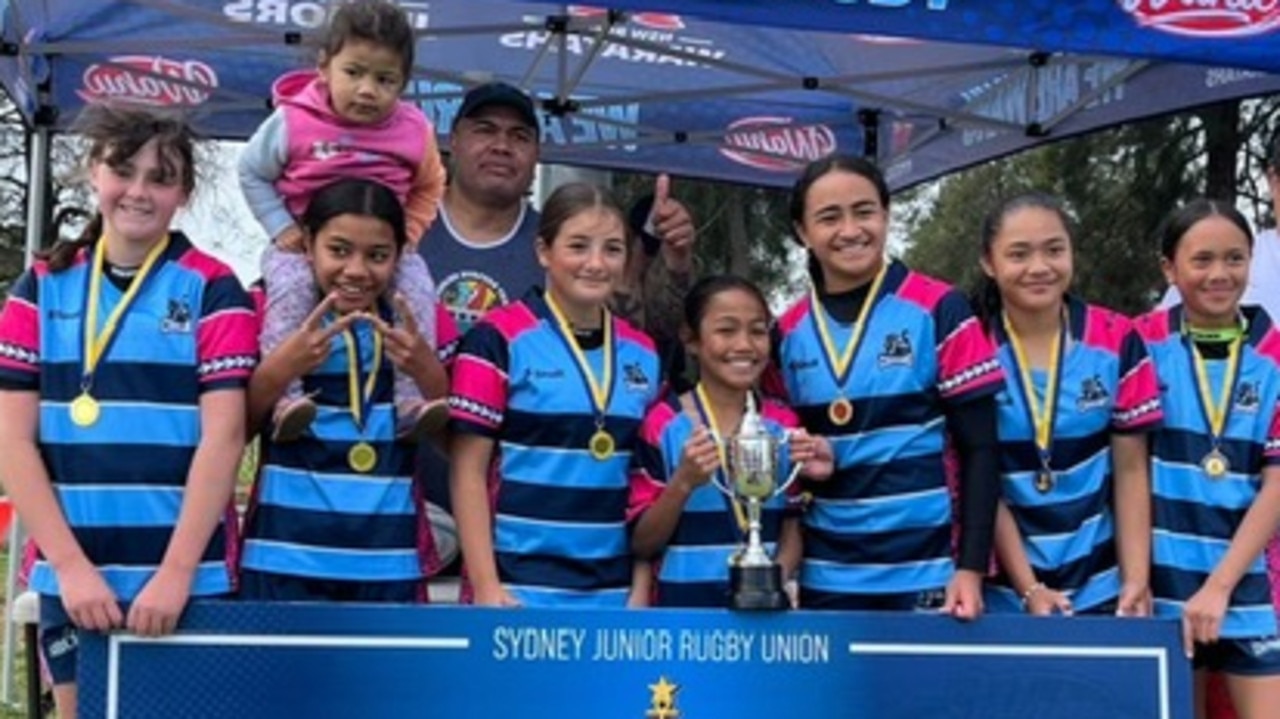Rugby Australia chief executive Phil Waugh details how the code will rebuild in the Wallaby way
Just 10 months into the role as CEO of Rugby Australia, Phil Waugh has been thrown into the fire. Now with a new chairman appointed, and quite possibly a new board, he is ready to reinvigorate the sport that has given him so much.

Looking back, Phil Waugh did some pretty reckless things when he was playing rugby for Australia.
Disregarding any pain he was feeling at the time – and the lasting damage he was doing to his body – Waugh never gave a second thought to the perils he was putting himself in, whether it required trying to wrestle the ball from men the size of bears or getting trampled at the bottom of a ruck.
An old-fashioned breakaway, he busted more bones and spilt more blood than he cares to remember but was renowned for never taking a backward step while doing his bit for the greater cause.
That’s the Wallaby way.
Fast forward to 2024, a decade and a half since he last wore the Australian gold jersey, and Waugh is still taking a bullet for the team, only this time as CEO of Rugby Australia (RA).
Already an established success in the corporate world, the 44-year-old gave up a plum job in Sydney banking to take a stab at the most poisoned chalice in Australian sports administration, trying to restore rugby to its former glory.

“I’ve benefited a lot through my entire life from rugby,” he said. “So I see it as a good opportunity to give back to the game.”
So, he’s a man on a crusade? Or a glutton for punishment? Or just a blinded fool?
Take your pick, because the result has been the same.
Like most of his well-intentioned predecessors, Waugh has found himself caught in the crossfire of a long and divisive battle about how best to run Australian rugby.
But he did at least go in with his eyes wide open so isn’t bleating about the hits he’s copping.
That’s also the Wallaby way.
“I run my life in having no regrets. That’s why this job was so attractive to me,” he said.
“I think I can make a significant difference to the future of the game.
“It’s a massive honour and responsibility to be CEO of Rugby Australia, but similar to playing, anyone can put on a Wallaby jersey or Wallaroos jersey, but most importantly is how you perform.”
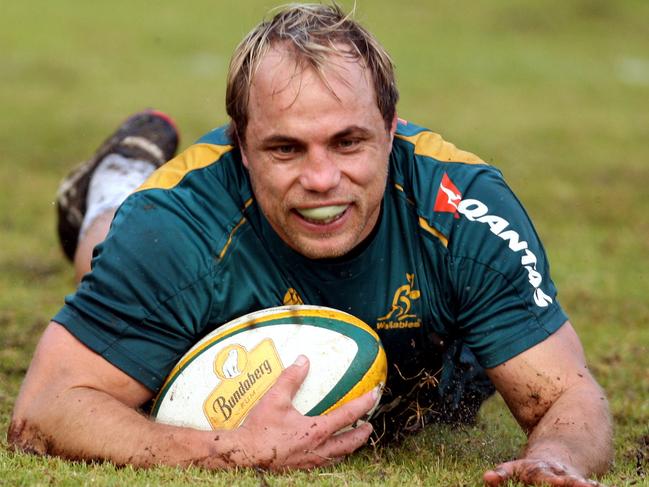
So far, the jury is out on Waugh’s performance after a rocky start.
Just 10 months into his job, he has been under siege right from the outset but is still holding the line, knowing that a verdict could be delivered much sooner than expected.
Rugby Australia’s annual meetings are normally pretty sedate events, but next week’s get-together – on April 29 – is looming as one of the most pivotal in the game’s history.
With Rugby Australia already in financial strife after the pandemic, the gamble to ditch the ineffective Dave Rennie and appoint Eddie Jones as head coach for last year’s World Cup backfired disastrously, and the stench still hasn’t gone away.
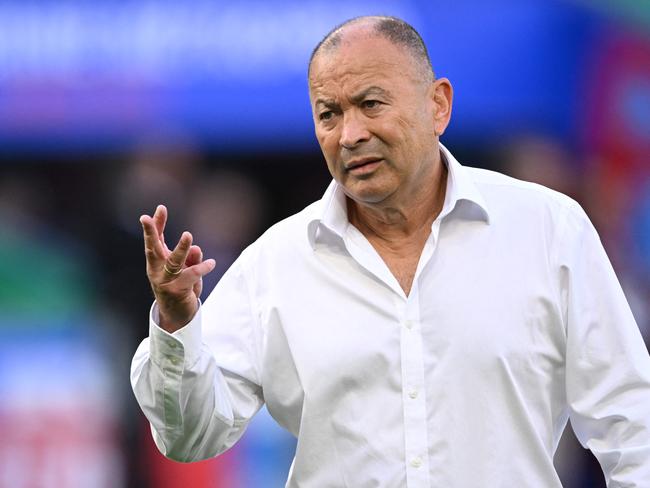
Waugh’s been implicated by association because he and Jones go back a long way.
Jones picked Waugh to be his vice-captain for the 2003 World Cup, where the Wallabies made the final, but when he was under pressure to fall on his sword after the 2023 World Cup, it was Waugh who spoke with him face to face.
“I’ve known Eddie for 25 years. And it was a difficult period last year, which everyone acknowledges,” Waugh said.
“Pleasingly, Eddie acknowledged the difficulty as well and Eddie had an opportunity to step away and he did it in an appropriate way.
“It’s now very much a line in the sand and let’s get the game back to the heights it should be at.”
Jones fell on his sword then Hamish McLennan was ousted as chairman, replaced by Dan Herbert, another former Wallaby, but the natives are still restless and want more heads to roll.
There are growing calls for a major overhaul of RA – including the dismantling of the existing board and the adoption of a new constitution – with the battle lines being drawn ahead of the AGM.
Just as he was in his playing days, Waugh is pleading for everyone to stay calm, arguing that another boardroom revolt won’t solve anything because now, more than ever, is the time for everyone to stick together.
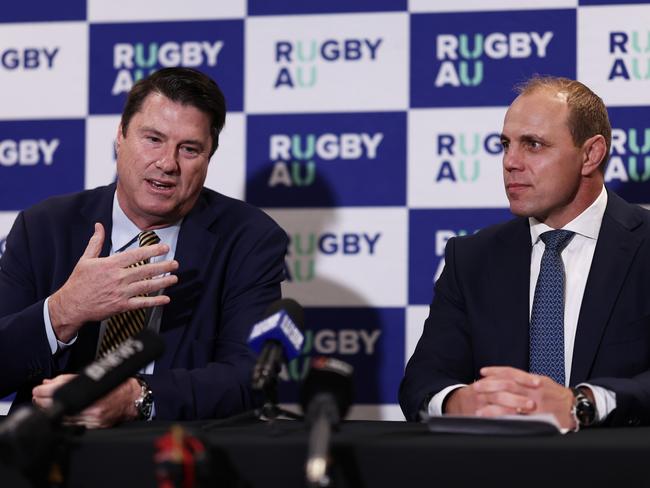
“We’ve had a very disrupted six to 12 months, which obviously everyone’s very aware of,” Waugh said.
“The results of the World Cup were bitterly disappointing for all Australians, not just sports lovers or rugby lovers, but for all Australians and we’re very conscious of that.
“Notwithstanding the commentary that is in the public domain, and we acknowledge and recognise some of the dissatisfaction that is out there, but we are also very confident that we’ve somewhat steadied the ship and we’ve got a lot of work to do to rebuild the trust, given the disappointment of the World Cup.”
One thing that will disappear under Waugh’s watch are the so-called captain’s calls.
“Maybe it’s my 13 years in banking that’s really drilled this into me is that the discipline and governance you need to follow to make decisions is really important,” Waugh said.
“We need to ensure we have the appropriate discipline across the organisation to ensure we’re making the right decisions.”

John O’Neill, who oversaw Australian rugby in the halcyon days, when the Wallabies were champions of the world and able to fill in every stadium in the country, agrees that it’s time for all the warring factions to come together.
“One of my constant themes when rugby was trying to destroy itself is there had to be a unity of purpose. There had to be a common sense of what are we here for?” O’Neill said.
“And that unified purpose, now more than ever, has to be the glue that brings rugby in Australia back to a point of some success or some competitiveness.
“The magnitude of the challenges they have are the likes of which we’ve never seen. We’ve had too long a period of hobby farmers who felt that running Rugby Australia was a part time job.
“I’m absolutely zealous about the seriousness of running a major sporting body, whether it’s soccer, or whether it’s cricket or whether it’s the NRL or whether it’s rugby union, you have to have the best of the best running it.”
Regardless of whether the knives are unsheathed or not, there will be significant changes to the board at the end of this month.
It can be revealed that Alexi Baker, a former NRL executive, and businessman Hans Pearson have been nominated to fill the directors roles vacated by Waugh and McLennan.
Former Wallaroo Kristy Giteau has also been hand-picked by the independent nomination committee to join Joe Roff as co-president, becoming the first woman to take on the role.
Pip Marlow will step down later this year while three other directors – Jane Wilson, Karen Penrose and Matthew Hanning – are seeking re-election.
Waugh is confident the new nominees will strengthen a board that can deliver on its promises.

“For meaningful impact, it takes time and continuity within the tenure on the board,” Waugh said.
“So if I look at the capability of the current directors, and clearly the process they’ve gone through to recruit the two directors up for new election, we feel like we’ve got a very strong, and very united board.
For all the problems rugby finds itself in now, there is still a way out of the deep hole with Australia locked in to host a series of major, money-making international events over the next decade.
RA has already taken out an $80 million debt facility to cover the losses from the 2023 World Cup and the year ahead, but the cash will start to roll in after that.
Around 40,000 overseas tourists are expected to travel to Australia in 2025 for the British and Irish Lions tour, which happens only once every 12 years, then Australia will host the men’s (2027) and women’s (2029) Rugby World Cups.
““It’s going to be a huge event and a considerable revenue event for Rugby Australia. If we think about the Pacific Equity Partners debt facility that we will have, it’s certainly our intent to extinguish any debt we have on our balance sheet through the revenues we’ll earn through the Lions,” Waugh said.
“If we can maximise the revenues through the 2025 Lions tour and extinguish the debt facility that we have in place, we go into a new broadcast cycle in 2026, and if we have right-sized the professional game to ensure the appropriate discipline within the business, we go into 2026 debt free and hopefully establish a sustainable professional system from ’26 onwards. And then we have the massive revenue event of the ’27 men’s World Cup, and hopefully the ’29 Women’s World Cup is a significant revenue event as well.
“We can then invest those earnings to set the game up in perpetuity.
“If you think about it really simply, pay down debt with the Lions revenue, set up the game in a sustainable way from ’26 onwards. And then ensure that we’re investing the revenues from ’27 and ’29 so that we’ve got a future fund that supports the game not only at a professional level but most importantly at a community level.”
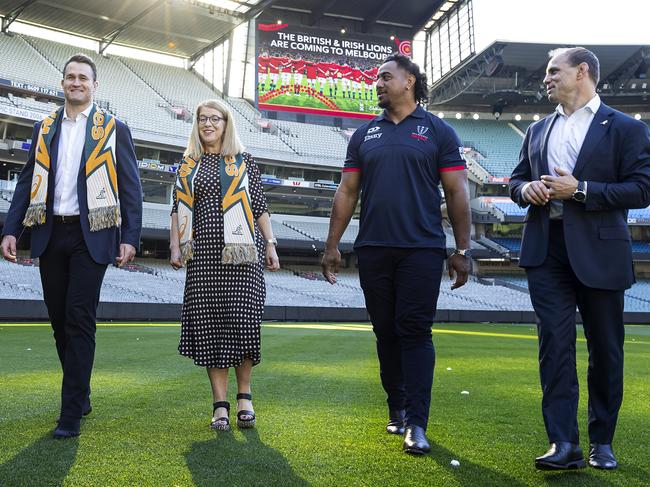
If Rugby Australia does manage to get everything right, the code should be able to thrive again, but the sceptics remain wary because Rugby Australia has made a hash of things before and the road ahead is still full of potholes.
“The (2024) finances will be consistent with every other Rugby World Cup year and consistent with all other national union results in the fact it’ll be a significant deficit,” Waugh said.
“One of the changes that I think we need to start talking about within rugby is the fact we shouldn’t be overly focused on individual-year outcomes. We should actually be looking at whether it’s a four-year cycle or a five-year cycle because depending on the incoming touring teams and depending on whether it’s a Rugby World Cup year has a material impact on the overall financial performance of the union.
“So we’ll be challenged again in 2024 and those challenges will be largely around the inbound tours. Two tests against Wales and one against Georgia is materially different to three Tests against England, which we had in 2022.”
There are other more pressing issues.
There is still no final decision on the fate of the Melbourne Rebels or how many Super Rugby teams Australia can afford to fund, though that will come soon enough.
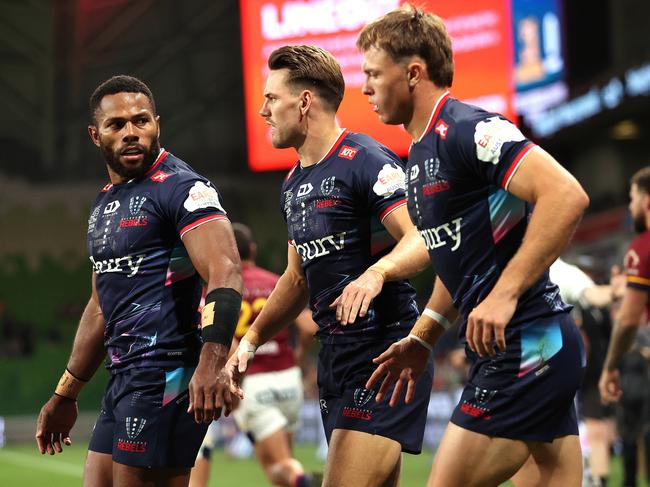
“I don’t have a definitive number for how many teams that we can afford. What I will say is that we need a sustainable, professional rugby model in Australia,” he said.
“Clearly we’ve seen some challenges, financially across our Super Rugby clubs. Equally, we’re seeing some challenges across our performance at Super Rugby level which then flows through to the performances at a Wallaby level.
“There’s multiple inputs that go into the decision going forward on the Rebels.
“It’s really important to recognise we need to live within our means and being debt free by the end of ’25 and a sustainable rugby model going forward from ’26 onwards.
“That’s a really important starting point as to how we get to the decision.
“I know from running big businesses in banking, your cost structure is really important and making sure that you’ve got an efficient model. I’ve just done a restructure across my business and essentially I’ve tried to streamline the business.
“We can’t be all things to all people and we can’t do everything without focusing on where it’s going to drive the greatest engagement with the rugby community.”
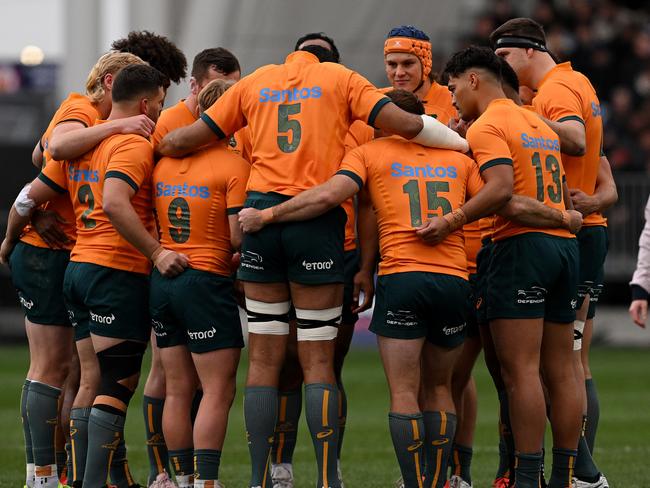
Rugby Australia is also looking for more sponsors after losing Harvey Norman last year, and will soon have to negotiate a new broadcast deal, but Waugh is confident of striking a good deal.
“We’re in an exclusive negotiation period with Channel 9 through to the end of the 2024 calendar year. And we’re working closely with (them) on that process,” he said.
“Similar to building trust with the rest of our rugby supporters, we know we need to build value through the product we’re putting out onto the field but we’re pretty optimistic with, certainly the start of Super Rugby but just the talent coming through across the women’s and men’s game, that there significant value to be had through the next broadcast cycle.”
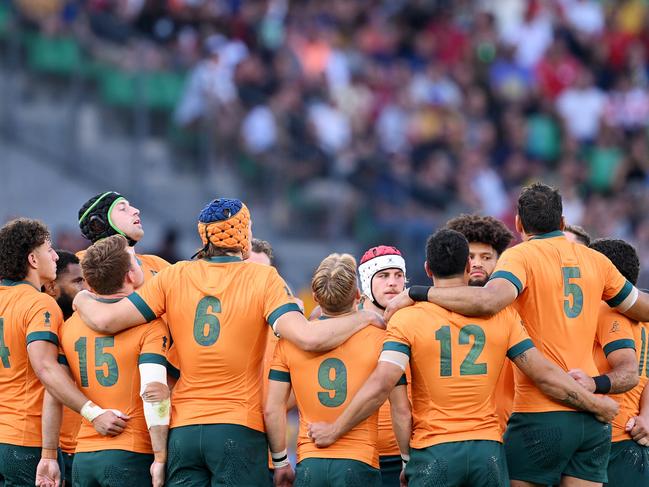
While Waugh’s pitch about stabilising Rugby Australia’s governance and finances is critical, it’s not what the game’s fans are really fretting about.
They want to see performances on the field improve.
That’s ultimately still the board’s toughest challenge.
The Wallabies haven’t won the World Cup since 1999.
Last year, they failed to make it out of the pool stages for the first time.
They haven’t won the Bledisloe Cup since 2002 or the Rugby Championship since 2015.
The last time an Australian team won Super Rugby was in 2014.
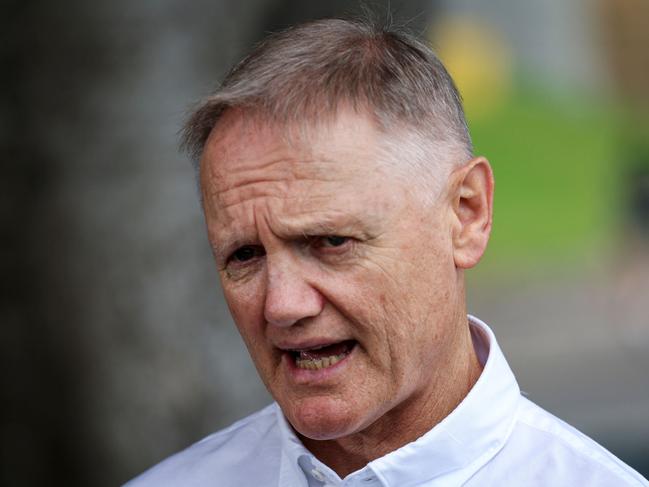
But there are glimmers of hope. One of the unexpected benefits of the World Cup fiasco was that it fast-tracked the overhaul of Australia’s professional game, with the appointment of Peter Horne as the director of high performance and Joe Schmidt as head coach.
“I’m feeling reasonably optimistic,” Waugh said.
“I think we’re putting the right people in the right roles and the right. Everyone talks about the World Cup year as being the most important year but in my view you need to win every single test match you play.
“Winning between World Cup years is in a lot of ways more important than having a peak at the World Cup and then failing in between (but) I certainly won’t be one that’s reaching out for sugar hits.’’





